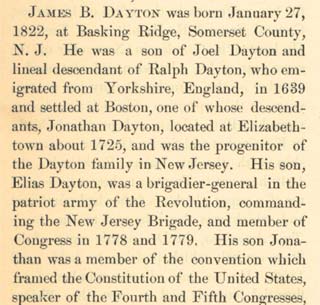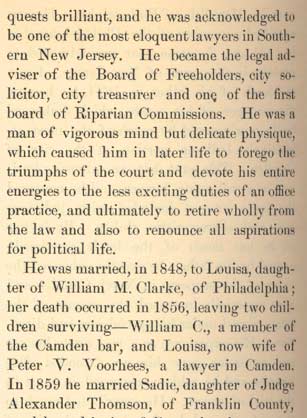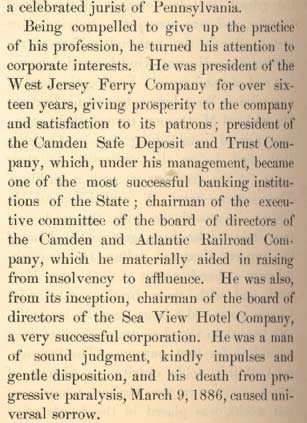|
James |
|
JAMES B. DAYTON was a prominent lawyer and leading businessman in 19th Century Camden. Born in Somerset County on January 22, 1822, he graduated from Princeton University in 1841. He then studied law under his brother, William Dayton. William Dayton served as U.S. Senator from New Jersey from 1842, to 1851, was the first Republican Vice-Presidential candidate in 1856, and was America's Minister to France during the Civil War. After passing the bar James Dayton came to Camden and set up practice. He soon became City Solicitor, City Treasurer, and legal advisor to the Board of Freeholders. Married in 1848, James Dayton's wife Louis passed in 1856, leaving him with two children. He remarried, but his own poor health caused him to give up his law practice. James Dayton pursued other business interests. He is best remembered as President of the West Jersey Ferry Company for sixteen years, President of the Camden Safe Deposit and Trust Company, and Chairman of the executive committee of the Board of Directors of the Camden & Atlantic Railroad. All of these enterprises prospered under his management. James B. Dayton died on March 9th of 1886, survived by his wife Sadie Dayton, son William, a lawyer in his own right, and daughter Louisa, who was married to prominent Camden attorney Peter V. Voorhees. After his passing a street in Stockton Township was named Dayton Street. This street was renamed 18th Street after the 1899 merger with Camden. A street in Camden which runs from Mount Ephraim Avenue opposite Evergreen cemetery towards Haddon Avenue was laid out and named Dayton Street sometime between 1890 and 1906. |
|
THE HISTORY OF CAMDEN COUNTY NEW JERSEY, George Reeser Prowell - 1886 |
|

|

|
| …continued… | |

|

|
![]()
|
1861- THE FIRST WAR MEETING IN CAMDEN |
||||
|
On the 16th of April, 1861, three days after the Confederates fired upon Fort Sumter, at the entrance of Charleston Harbor, a large number of loyal and patriotic citizens of Camden City and County issued the following vigorous and spirited response to the President's proclamation: " To the President Of the United States: " The unparalleled events of the last week have revealed to the citizens of the United States, beyond question or the possibility of a doubt, that peaceful reconciliation upon the form of our Con-stitution is repelled and scorned, and secession means, in the hearts of its supporters, both Trea-son and war against our Country and Nation. " We, therefore, the undersigned Loyal Citizens of the United States, and inhabitants of the city of Camden, in the State of New Jersey, responding to the proclamation of the President of the United States, hereby declare our unalterable determination to sustain the government in its efforts to maintain the honor, the integrity and the existence of our National Union and the perpetuity of the popular Government, and to redress the wrongs already long enough endured; no differences of political opinion; no badge of diversity upon points of party distinction, shall restrain or withhold us in the devotion of all we have or can command to the vindication of the Constitution, the maintenance of the laws and the defense of the Flag Of our Country."
In response to a call, on the 18th of April an
enthusiastic meeting was held in the county court-house, which was formed of a large
collection of prominent citizens. The court-room was decorated with flags and mottoes.
John W. Mickle was chosen president and Samuel C. Harbert and Thomas G. Rowand
secretaries. The president addressed the meeting first and Rev. Mr. Monroe offered a
prayer. Hon. Thomas P. Carpenter, Thomas
B. Atkinson (mayor) and Joseph Painter were appointed a committee on
resolutions. Judge Philip J. Grey addressed the meeting, after which the committee
adopted a long series of patriotic resolutions. The Washington Grays, Stockton Cadets
and the Zouaves marched into the room and were received with cheers, Samuel Hufty read a
resolution which was signed by many persons, who immediately formed the Home Brigade.
David M. Chambers, Captain Stafford,
Benjamin M.
Braker, John H.
Jones and E. A. Acton each addressed the meeting. James M. Scovel was then called
upon and responded in eloquent terms and with patriotic energy. S. H. Grey offered a
resolution, which was adopted, that the City Council and the Freeholders of the county
be requested to appropriate money for the equipment of persons who may volunteer in
defense of the country, and S. H. Grey,
James M. Cassady and Joseph Painter
were appointed a committee to look after the interests of the resolution. The meeting
continued in session until eleven p.m. |
![]()